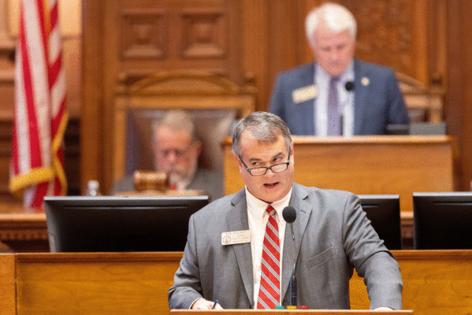Georgia GOP lawmakers make eleventh-hour bid to expand government secrecy
Published in News & Features
ATLANTA — State legislators and the police could shield more of their work from the public under a surprise last-minute proposal which emerged in the General Assembly.
Under Senate Bill 12, legislators could keep secret their communications with state agencies.
The bill also could make it harder to get basic information from police incident reports and the comings and goings of public employees from government office buildings.
The provisions were added to the bill late Wednesday with no notice and could get a vote in the state House of Representatives on Friday, the final day of the legislative session.
The Georgia First Amendment Foundation, which advocates for open government, said SB 12 would make the public’s business less transparent. In a statement, the group criticized the way the proposals were rolled out “at the last minute, and after the point at which the public could provide comment.”
The Georgia Open Records Act requires government documents to be available for public inspection and copying. The idea is to ensure the public can learn about government operations and to make it harder for public officials to cover up abusive or illegal behavior. There are exceptions to disclosure to protect the privacy and safety of people and businesses.
SB 12 was originally a three-page bill that sought to clarify that public records maintained by private entities had to be requested through a public agency. But in the House Rules Committee late Wednesday, it morphed into a 34-page bill that added various exemptions to the Open Records Act.
The Georgia Open Records Act already exempts the General Assembly’s internal communication and records from disclosure. The revised SB 12 would also exempt legislative communication and information shared with other state agencies and officials.
Rep. Rob Leverett, a Republican from Elberton, told the Rules Committee that the legislative provision “was not viewed as being a substantive change, but just confirming what was already an exemption to existing law.”
The Georgia First Amendment Foundation said the provision would “broaden that exemption to cover even records in the (state) executive branch, which we find very concerning.”
The bill also would shield some law enforcement records from disclosure.
Currently, police records of pending criminal investigations are exempt from disclosure, but initial incident reports are open to the public. SB 12 would narrow the definition of those incident reports, potentially limiting public access to information on officers’ traffic stops, arrests and incident responses.
The move to tighten what police must provide the public comes after Appen Media, a family-owned media company in the North Atlanta suburbs, filed a lawsuit that the Sandy Springs Police Department allegedly violated the Open Records Act by tailoring its police reports to include minimal information.
Finally, SB 12 would exempt electronic records that show people arriving and departing from state government buildings. Leverett said the provision addressed the safety and security of state employees — protecting information about their location at any given time.
The foundation said the exemption would shut down “important reporting” on government employees. One example: an Atlanta Journal-Constitution report on highly-paid Public Service Commission employees who never showed up at the office.
The Rules Committee approved the revised SB 12 over the objection of some Democratic legislators Wednesday night.
But instead of receiving a vote in the full House, legislative leaders referred the bill back to the Rules Committee, which will meet Friday, the final day of the legislative session.
_____
©2025 The Atlanta Journal-Constitution. Visit at ajc.com. Distributed by Tribune Content Agency, LLC.







Comments